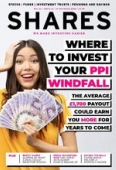Archived article
Please note that tax, investment, pension and ISA rules can change and the information and any views contained in this article may now be inaccurate.
UK dividend growth under threat

Dividends from UK stocks may not be as reliable as investors have come to believe.
The latest Dividend Monitor report from Link Asset Services shows that while dividends rose 6.9% on a headline basis to £35.5bn in the third quarter, growth was entirely driven by one-off factors and currency movements rather than healthy gains in corporate cash generation.
The growth came from some ‘exceptionally large’ special dividends and gains from a fall in the value of the pound as dollar and euro-denominated dividends enjoyed a higher relative value.
On an underlying basis the picture is far less healthy. Dividends were down 0.2% excluding special dividends and, once you strip out currency gains, dividends were almost 3% lower. This represents the worst quarterly performance in three years.
And while the full year is expected to show headline growth of more than 10%, this again reflects a combination of bumper special dividends and sterling weakness.
While the media and airline sectors delivered strong year-on-year growth in the quarter, the retail sector and telecoms space both saw big slumps with high profile dividend cuts at the likes of Vodafone (VOD), Marks & Spencer (MKS) and Dixons Carphone (DC.).
One compensation for investors is the high yield offered by UK stocks; Link puts this at 4.4% which is close to historic highs. Just as with an individual company, an unusually high dividend yield from the broader market can be a warning signal that payouts are unsustainable at their current level.
Link Asset Services also notes the level of dividend cover – the extent dividends are covered by earnings – for UK stocks is among the lowest globally at just 1.6-times. As a rule of thumb any ratio below 1.5-times is typically seen as a sign the dividend could be under threat.
The table displaying the FTSE 350 stocks with the lowest dividend cover suggests the dividends paid by asset managers Standard Life Aberdeen (SLA) and St James’s Place (STJ) could be vulnerable to a cut. Despite the company already reducing its dividend, Vodafone’s payout also remains in the danger zone.
Important information:
These articles are provided by Shares magazine which is published by AJ Bell Media, a part of AJ Bell. Shares is not written by AJ Bell.
Shares is provided for your general information and use and is not a personal recommendation to invest. It is not intended to be relied upon by you in making or not making any investment decisions. The investments referred to in these articles will not be suitable for all investors. If in doubt please seek appropriate independent financial advice.
Investors acting on the information in these articles do so at their own risk and AJ Bell Media and its staff do not accept liability for losses suffered by investors as a result of their investment decisions.
Issue contents
Big News
- Woodford Equity Income wind-up shakes fund industry to its core
- Could debt concerns at rival help Domino's Pizza?
- Shareholder dissent remains muted
- First glimpse at how stocks could react to positive Brexit deal
- TUI and Jet2-owner Dart capitalise on Thomas Cook ‘game-changer’
- UK dividend growth under threat

 magazine
magazine

